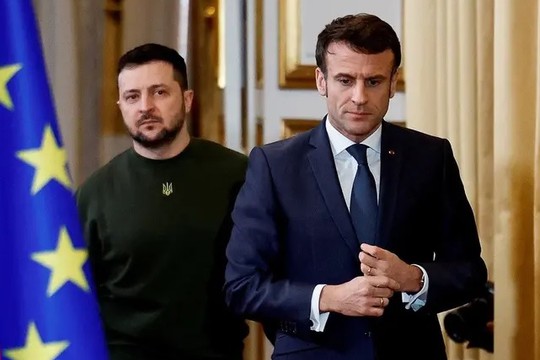Macron in thoughts: “What shall I do with him?..”
Photo: Reuters
Assistance to Kyiv may be the first casualty in the French president’s pick for prime minister, writes ‘The Responsible Statecraft’.
Sixty days after the parliamentary elections that delivered a hung parliament, French President Emmanuel Macron has nominated the experienced center-right politician Michel Barnier as the nation’s new prime minister.
Irrespective of Barnier’s qualities, this decision, more than pointing to an exit from France’s political crisis, risks plunging the country deeper in a turmoil which could undermine support for Ukraine and impair its ability to play a significant role in Europe and on the world stage.
Barnier’s last stint in the limelight was in his role as the chief EU negotiator on Brexit from 2016 to 2019. Former British diplomat Peter Ricketts described him as “a competent technocrat, formal, unbending, and not that well known in France as he has spent decades in various jobs in Brussels.”
The last point may indeed be true, but before decamping to Brussels, Barnier, a surviving pillar of the French Gaullist tradition, served as minister for European affairs and then foreign minister in the administration of President Jacques Chirac (1995-2007), who was infamous in Washington for his staunch opposition to the U.S./U.K. war in Iraq and the broader neoconservative project of remaking the Middle East into liberal democracies with military might.
Fast forward to 2024: Barnier’s skills and experience are not at issue — what’s concerning is that Macron chose him as prime minister.
To begin with, Barnier’s democratic legitimacy is fraught. The parliamentary elections, convened by Macron in the wake of his centrist party’s crushing defeat to the far-right National Rally in the elections to the European Parliament in June, were won by the left-wing New Popular Front (NPF) with 180 seats, followed by Macron’s centrist “Ensemble” (“Together”) with 159 seats, Marine Le Pen’s far-right National Rally (142) and Barnier’s center-right Les Republicainswith 39 mandates. While the NPF, as the winner of the plurality of seats in the assembly, proposed its candidate to form the government — the economist Lucie Castets — it was snubbed by Macron in favor of Barnier from the smallest of the parties in the parliament.
French pundits, such as the high-profile former ambassador in Washington, Gerard Araud, tried to spin Macron’s choice as democratically unimpeachable given that the left only represents 28% of the electorate and 32% of the parliament.
There is, however, bad faith inherent in that argument: in the French system, prime ministers do not have to win a majority in the parliament to govern, only ensure that they are not censured through a non-confidence vote. Thus, Macron could have respected the voters’ will and let the NPF’s candidate govern in exchange for moderating the left’s program. That would have been all the more logical as Macron forged a “Republican Front” with the left against Le Pen’s party. Macron and the leftists combined have 57% of the votes in the assembly which makes for a censure-proof majority.
Macron’s refusal to make a deal with the left means that he had to reach a prior agreement with his declared nemesis — Le Pen. Indeed, Le Pen herself admitted that Barnier satisfied at least one criterion important to her party — namely, that he is “respectful of different political forces and capable of addressing National Rally’s concerns.” Since under no conditions will the left support Barnier’s government, its only chance of survival rests on Le Pen’s good graces. Macron, who built his career as an embodiment of the liberal center, has handed his most formidable adversary on the right unprecedented bargaining power.
Naturally, such an about-face by the French president has enraged the left. Jean-Luc Melenchon, the leader of La France Insoumise (France Unbowed), a key component of the NPF, accused Macron of violating the national will. Street protests, strikes, student demonstrations are likely to follow.
Indeed, a prime minister picked from the least popular party in the parliament feeds the growing perception that, regardless of the results of elections, the same entrenched elite interests rule permanently.
That would be bad news for Ukraine. There already is a gap between Macron’s ardent support for Kyiv and the much more skeptical attitude held by the French public. According to polls, 68% of French adults say Macron was wrong in his suggestion in June that France could send troops to Ukraine, and 74% say they oppose sending Western troops to Ukraine.
Le Pen may have softened her Ukraine-skeptic and Russia-friendly image lately, but her priorities decidedly do not include escalating French involvement in Ukraine. Those are focused on domestic political issues, such as “out of control immigration, explosion of insecurity and the erosion of the purchasing power of the French,” among others.
It is true that in the French system the president preserves significant prerogatives in the field of foreign and security policy. Yet by gambling on the parliamentary elections and de facto refusal to recognize their outcome, Macron has ended up empowering his sworn political adversaries and endangering much of his political agenda, including, certainly, France’s steadfast support for Ukraine in the long term. Sad wreckage of a legacy for someone once touted as France’s, and Europe’s, best hope for international relevance.
read more in our Telegram-channel https://t.me/The_International_Affairs

 11:32 11.09.2024 •
11:32 11.09.2024 •























